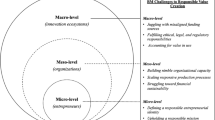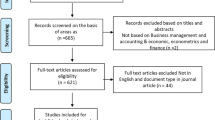Abstract
The COVID-19 pandemic has impacted many businesses but has especially impacted small businesses (Dua et al. 2020, Eggers 2020). In the early months of the pandemic, many small business owners did not have the financial ability to sustain their services due to lacking funds during the shut-down (Bartik et al. 2020). This has significant long-term effects on the global economy as small-to-medium size businesses comprise 90% of all global businesses and 55% of GDP (Salesforce 2019). The demise of small businesses could have incomprehensible long term impacts on the global economy. As a result, it is not surprising that many scholars are calling for more research to understand how businesses can continue their services during the global pandemic (e.g., Batat 2020; Heinonen and Strandvik 2020; Sajtos et al. 2020).
Although past research has investigated crisis management from a marketing perspective, little research has explored how small businesses are able to continue services in a crisis of this extent. Past research recognizes that business model innovation can offer new profitable opportunities and/or provide a shield against dynamic environmental changes (McDonald et al. 2019; Teece 2018), but less work has explored how small businesses can attain business innovation models in the challenge of a significant crisis, such as the COVID-19 pandemic. As such, we explore the following research question: What can enable small businesses’ business model innovation during a crisis?
To investigate this research question, we take an inductive, qualitative approach. Using qualitative interviews with 10 industry-diverse small business owners and 5 small business resource providers, the data reveals there are multiple paths to pursuing their interests in sustaining business. Specifically, we identify that through a cocreative process, small businesses rely on technology and intermediary organizations to foster new forms of pursuing business, specifically engaging in business model innovation (BMI). This research answers calls for research inquiring how businesses, and specifically small businesses, are able to help others cope with the crisis and support the economy (Pantano et al. 2020).
Access this chapter
Tax calculation will be finalised at checkout
Purchases are for personal use only
Similar content being viewed by others
Author information
Authors and Affiliations
Corresponding author
Editor information
Editors and Affiliations
Rights and permissions
Copyright information
© 2022 The Author(s), under exclusive license to Springer Nature Switzerland AG
About this paper
Cite this paper
Hass, A., Anderson, K.C., Mitchell, C. (2022). Enabling Creative Small Business Innovation in a Crisis: An Abstract. In: Allen, J., Jochims, B., Wu, S. (eds) Celebrating the Past and Future of Marketing and Discovery with Social Impact. AMSAC-WC 2021. Developments in Marketing Science: Proceedings of the Academy of Marketing Science. Springer, Cham. https://doi.org/10.1007/978-3-030-95346-1_53
Download citation
DOI: https://doi.org/10.1007/978-3-030-95346-1_53
Published:
Publisher Name: Springer, Cham
Print ISBN: 978-3-030-95345-4
Online ISBN: 978-3-030-95346-1
eBook Packages: Business and ManagementBusiness and Management (R0)




